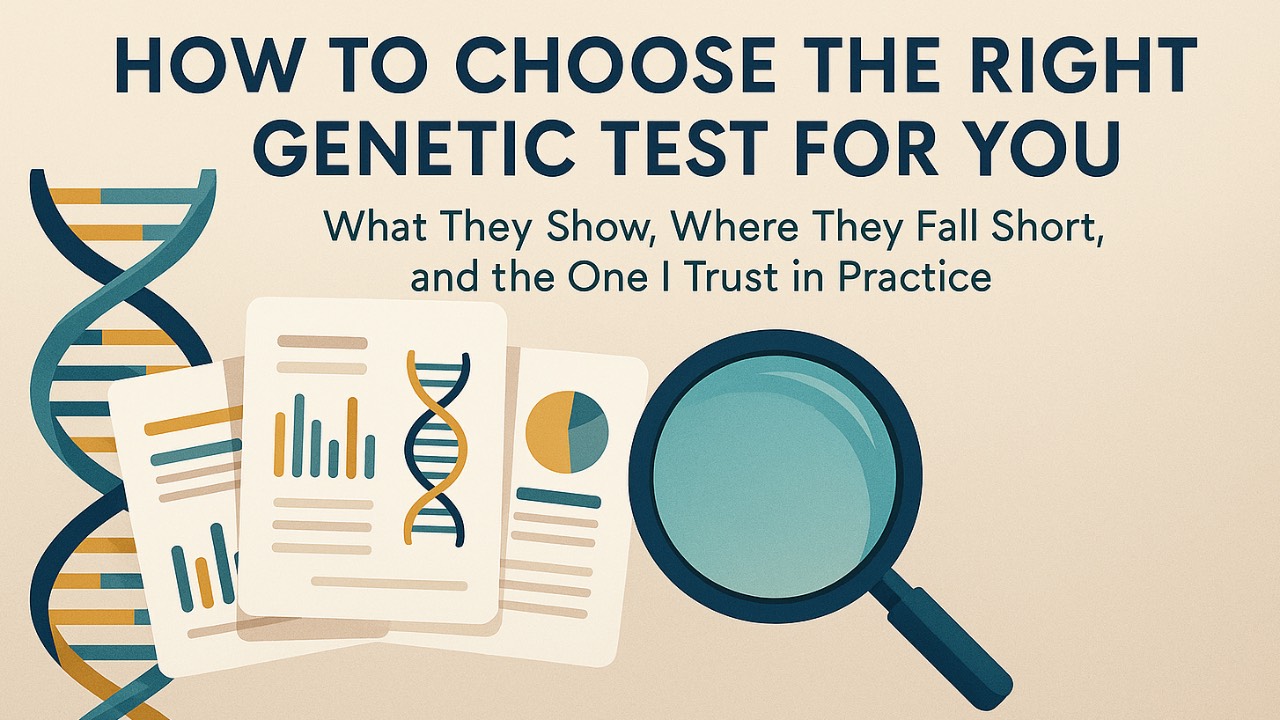How to Choose the Right Genetic Test for You: What They Show, Where They Fall Short, and the One I Trust in Practice
May 03, 2025
You’d think with how much we hear about “bioindividuality” and “precision health,” there’d be a clear path forward by now.
Especially when it comes to genetic testing. I mean, we only started mapping the human genome in 2003, so in the grand scheme of things, it’s still pretty new. Maybe the industry’s still catching up. But even so, we’ve learned a lot since then and at this point, we should be doing better.
But if you’ve ever Googled “best genetic test for health,” you already know, the waters are muddy.
One site points you toward ancestry kits with a side of health reports. Another promises to “hack” your biology through DNA. And before you even figure out what SNP stands for, you’re three blogs deep, overwhelmed, and wondering if any of this actually matters.
It does. But not in the way most tests would have you believe.
Why Most People Look Into Genetic Testing in the First Place
Rarely do people explore their DNA just for fun.
More often, it’s because something in the body just… won’t budge.
You’ve cleaned up your diet. Added magnesium. Cut caffeine. Watched your labs like a hawk. But energy is still unreliable. Anxiety flickers in and out. Hormones are weirdly unpredictable. You’re doing “all the right things,” but your body still feels like it’s working against you.
That’s when the idea of genetic testing starts to whisper:
Maybe the answer is deeper. Maybe this is just how I’m wired.
And that’s a good question to ask. Just not every test is designed to help you answer it.
What Genetic Testing Can Actually Reveal
Let’s start here, because this alone can save people years of frustration.
Genetic tests don’t tell you what’s “wrong.” They don’t diagnose. They don’t guarantee you’ll get a condition. What they offer are tendencies. Wiring. Default settings your body might lean toward, especially under stress.
A few examples:
• You may not clear histamine as quickly, making you more reactive to certain foods or supplements.
• You might not process synthetic folic acid efficiently, causing sluggish methylation.
• You could recycle neurotransmitters a little too slowly or too quickly, which can influence how you respond to stress or stimulants.
• Your detox genes might work, but not at full efficiency and that could matter depending on your exposures.
But here’s the catch. If your test doesn’t connect those insights to real-world symptoms, it’s just noise.
And honestly? A lot of it is noise.
The 3 Most Common (and Costly) Mistakes People Make with Genetic Testing
1. Confusing Raw Data with Real Insight
You know those exportable files from 23andMe or Ancestry? They can be useful. But most people run them through third-party tools that spit out pages of SNPs with no hierarchy or prioritization.
You might read that you have a “mutation” (which, by the way, is often the normal variant), and spiral into thinking you’re broken.
Or you see ten genes with flags and start supplementing for all of them at once — without realizing some of those pathways push against each other.
I’ve seen people burn out their adrenals, overload their detox systems, or spiral into health anxiety… all from interpreting raw data without guidance.
2. Assuming More Genes = Better Insight
Some tests list hundreds of SNPs. It looks impressive. But in practice? You often don’t need that many to make powerful progress.
Sometimes, understanding your COMT, MTHFR, DAO, and PEMT variants in the context of your real symptoms tells you more than a 200-gene spreadsheet ever could.
Because it’s not the number of genes that matters. It’s the system they belong to, and how you interact with that system.
Genetics is a tool. Not a collection.
3. Overgeneralizing Based on One Gene
You’re “MTHFR” so you must need methylfolate, right?
Not so fast.
What if your COMT is also slow and you react to methyl groups? What if your PEMT gene affects choline and estrogen detox, and that’s actually where your fatigue is rooted?
Genes don’t act alone. You have to zoom out and see how they interact.
What a Truly Useful Genetic Test Should Actually Do
It should:
• Organize genes by system, not just throw SNPs into categories like “nutrition” or “fitness.”
• Connect dots between symptoms and patterns, not just list potential deficiencies.
• Avoid scare language and make results feel empowering without oversimplifying.
• Reflect real-life patterns you’ve probably already felt and finally explain them.
Like…
“I feel better skipping folate, even though everyone says I need it.”
“I get flushed after wine and certain leftovers.”
“I crash hard after a workout and feel worse when I try to detox.”
These are real, lived experiences. And if your genetic test can’t help make sense of them, it’s not the test that will help you move forward.
The Genetic Panel I Trust (And Why I Keep Using It)
After running genetic tests with hundreds of patients, the one I continue to come back to is The Works Panel by MaxGen Labs.
Why? Because it checks every box above — and leaves room for real-life nuance.
Here’s what it gets right:
• It organizes by system, like methylation, neurotransmitters, histamine, detox, hormone clearance
• It includes essential but often-missed genes like PEMT, GAD1, SLC19A1, and CYP1B1
• It doesn’t over-interpret the data, it gives you data and leaves space for personalization
• It respects complexity, it doesn’t pretend to solve everything with one gene or one supplement
Clients often say, “I finally feel seen and I see now that what I’m experiencing is logical based on the genetic testing findings” Not because the test told them something shocking but because it gave language to a pattern they’d been feeling for years.
What to Watch Out For Before You Dive In
1. It won’t write your whole plan.
Genetics isn’t a prescription. It’s a context map. You’ll still need to layer in symptoms, lifestyle, and current stressors.
2. It won’t tell you everything.
Not all genes are covered. Not all interactions are known. But it can give you a smarter starting point and that’s usually what most people need.
3. You’ll still need pacing and support.
If you start supporting methylation before your detox or histamine systems are ready, you can feel worse. That’s why stepwise interpretation matters just as much as the results.
A Better Way to Think About It All
You’re not looking for a diagnosis in these genes. You’re looking for friction points.
Places where your body may struggle to keep up, especially under pressure. Places where small tweaks could make big differences if you understand what’s upstream.
So instead of asking:
“What do I need to take for my MTHFR?”
Ask:
“What systems are showing strain right now? And what support would help that system feel safer?”
The Test I Use, With a Link if You’re Ready
If you’re ready to dig deeper, this is the test I use in my practice. It’s not the only good panel out there, but it’s the one that, time and again, has helped my patients and clients make actual progress.
Not because it promises everything. But because it gives you a starting point that finally makes sense.
Final Thought on Genetic Testing
Genetic testing isn’t about fixing something that’s flawed.
It’s about finally understanding the things that never quite added up and having the roadmap to work with your body. Not against it.
When you have that insight, not noise, not overwhelm, but clarity, you stop throwing supplements at symptoms and start building a plan that works with your body instead of against it.
That’s why I trust this test. And why it’s often the piece that shifts you back in to the driver seat.


